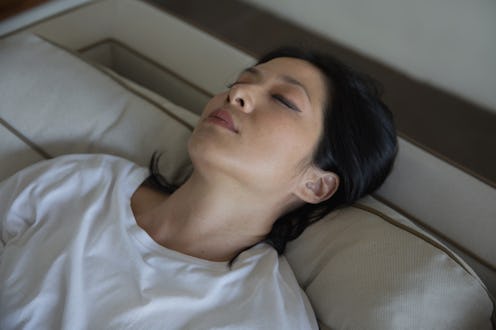Life
8 Habits Of People Who Are Good At Coping With Anxiety

Have you ever met someone so centered, so spectacularly chill that you have to know how they cope with anxiety? As a self-professed expert in neuroticism, I've found myself wondering the same thing far too many times. What's their secret — yoga? Going gluten-free? A stress ball they keep concealed in their right hand at all times? Unfortunately for the millions of people suffering from anxiety disorders in the United States, there's no magical over-the-counter cure to zap away your worries. That being said, adopting appropriate coping habits can be a huge help for anyone struggling with anxiety. All you have to do is find the ones that work for you.
According to the Anxiety and Depression Association of America (ADAA), about 40 million Americans struggle with anxiety disorders, making them the most common type of mental illness in the United States. Usually, they're treated with behavioral therapy, medication, or a combination of both. If you're looking for professional help, the National Institute of Mental Health (NIMH) is a great resource.
But people with anxiety disorders aren't the only ones who get anxious. It's a totally natural emotion. Problems start to arise, though, when worrying takes over your life. The following habits are no substitute for professional help, but they're worth a shot. If they help ease your anxiety, great! If not, you learned what doesn't work for you. Either way, it can't hurt to try.
1Monitor Caffeine
Have you ever felt your heart race after one too many cups of coffee? It's easy to forget that caffeine is a drug, but like all stimulants, research has shown it can exacerbate feelings of anxiety. Try cutting down on your caffeine consumption.
2Take Walks
As annoying as it is to hit the gym after a long day at work, working out is a well-known way to reduce stress. A quick walk has been shown to lift people's moods, and research suggests that regular exercisers are less likely to develop anxiety disorders (or depression, for that matter) over the years. Exercise also helps you sleep, so if you're having insomnia, consider adding a workout to your weekly routine.
3Breathe
Research has shown that something as simple as deep breathing can have a huge impact. Next time you're feeling stressed, focus on your breath. If you're interested, Time compiled a useful list of breathing exercises.
4Keep A Bedtime Routine
Anxiety can seriously disrupt sleep, and if you've ever struggled to stay awake the day after an accidental all-nighter, you know how stressful that can be. Manage insomnia by practicing sleep hygiene: Keep to a soothing bedtime routine, only go to bed when you're tired, and most importantly, give yourself enough time to sleep well. You can find a list of healthy sleep habits here.
5Meditate Once A Day
I'm sure someone has already suggested this, but short bouts of meditation can slow racing thoughts and clear your mind. Take a few minutes in the morning or evening every day to calm down.
6Acknowledge Your Worries
Remember how I said some anxiety is totally normal? Don't worry about worrying. Acknowledge your feelings, even if they're upsetting. Better yet, talk to a friend or professional about what's bothering you, even if it's a long list.
7Keep A Journal
Research has shown that keeping a regular journal eases stress and anxiety. As Psychology Today explains, "One of the most useful things you can do to combat stress and anxiety is keep a running record of your thoughts on paper." When you write your thoughts down, you can see patterns and understand yourself better. Besides, it's pure and simple catharsis.
8Set Your Sights Lower
This is for all those perfectionists who makes huge, sweeping goals for themselves, then beat themselves up for not achieving them. So you want to win the Pulitzer Prize one day? Great! Now set smaller, more achievable goals that will help you reach the big one in the future, so you won't get overwhelmed after your first rejection letter.
None of these are hard-and-fast rules for reducing anxiety, but hopefully at least one will work for you. If not, they're good lifestyle changes to make anyway — although I'll stick with my coffee consumption, thank you very much.